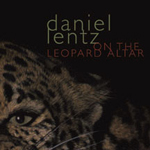|
|
 |
Dusted Reviews
Artist: Daniel Lentz Album: On The Leopard Altar Label: Cold Blue Review date: Mar. 12, 2006 |

|
|
|
 |
Out of print for more than two decades, Daniel Lentz’s 1984 album On the Leopard Altar was, until its recent reissue on the Cold Blue label, a lost gem of the high minimalist era in American art music. On Leopard Altar, Lentz mostly worked with the usual tools of the minimalist composer – a gamelan-influenced phased and staggered repetition of rhythmic and melodic materials; metallic, mallet instrument-derived keyboard tonalities – but his music almost always sounded different from that of others working within the genre. While earlier works of Riley, Glass and Reich explored various aspects of trance-inducing and non-western extended forms, and the more contemporaneous compositions of John Adams brought minimalist ideas to western classical structures, Lentz was unique in the way he applied a similar vocabulary of pulse and timbre to an aesthetic that seemed rooted in the sensuous, seductive values of post-1950s popular song.
“Is it Love?” opens with Glass-like synth throb and short sung syllables; but soon the piece begins to cycle through changing tonalities with a very un-minimalist chromatacism. And the vocal quartet sings with a burnished, close-voiced allure that hints more at vintage AM radio jingle than it does classical choir.
“On The Leopard Altar” points to the unique place the female voice can occupy in Lentz’s work. Over sparse, slow, and dreamy keyboard textures, Jessica Karraker’s intimate vocals intone a haunting, enigmatic song-poem. The mood is arresting and hypnotic, at once intellectual and seductive, perhaps even a bit redolent of beatnik-era jazz. Karraker is also at the center of “Requiem,” where, bathed in deep cathedral reverb and surrounded by tolling, chiming keyboards, her husky, warm-toned voice sings an eerie, slightly dissonant nocturne, creating a slightly gothic, sacred, noir-ish mood – something like a soundtrack theme in search of a David Lynch film.
Lentz brings a very different palette of tonal colors to “Lascaux,” a slow-moving piece for tuned wine-glasses, rubbed and struck . Resonant and spacious, the piece is simply beautiful: a meditation on the amazing ringing and sustained tones that can be unlocked from vibrating crystal.
“Wolf is Dead” is the album’s tour-de-force. With keyboard ensemble and vocal quartet in full minimalist interlock and pulse mode, Lentz presents a kaleidoscopic shifting and cycling of melodic and lyrical material in which musical and verbal meaning are eventually focused and dove-tailed with a wit and imagination reminiscent of Renaissance madrigal.
Like much of On the Leopard Altar, “Wolf Is Dead” offers elements not often found in art music: catchy melodic hooks; a pop music-influenced attention to mood, mix and detail, to the sensuous aspects of vocal timbre. Indeed, the whole album is paced like a good pop record, with peaks and valleys and a satisfying sense of dynamics. Perhaps that explains, at least in part, why it retains a decidedly non-academic freshness and immediacy – maybe even a timelessness – all these years after the minimalist tide has receded.
By Kevin Macneil Brown
|







